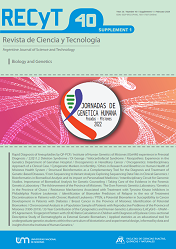The Achievement of the Province of Misiones: The Own Forensic Genetics Laboratory
Main Article Content
Abstract
On September 11, 2015, the Forensic Genetics Laboratory (LGF) of the Institute of Human Genetics of Misiones (IGeHM) began operating in the Health Park “Dr. Ramón Madariaga” of the Province of Misiones. It has specialized personnel and the latest generation of molecular analysis equipment. The Laboratory works through agreements signed in conjunction with the Superior Court of Justice of the province and provides services within the framework of several provincial laws. For the Judicial Branch, DNA analyzes are carried out to obtain genetic profiles, the results are interpreted, reports are prepared and any queries that may arise are answered. Since 2015, DNA analysis services have been offered in the field of Civil Justice in the province and since 2017 the service has been extended to the Criminal field. The IGeHM is, in addition, the entity in charge of carrying out the DNA analyzes framed in the Law XII- No. 31 of Free DNA, which establishes the free execution of the test for the benefit of people who lack economical means in civil cases. This is done upon request by the intervening Judge, in which the persons who must undergo the DNA parentage analysis and are covered by the Law are identified. The LGF-IGeHM also participates in generating autosomal and Y chromosome genetic profiles for the Provincial Registry of Persons Convicted of Crimes Against Sexual Integrity and the Provincial Bank of Digitized Genetic Fingerprints, which was sanctioned by law in 2010 (Law XIV – N ° 10) and that operates within the scope of the Superior Court of Justice of the Province of Misiones. The LGF-IGeHM respects the guidelines proposed by the ISFG (International Society of Forensic Genetics), for the correct implementation of a quality system, in order to reduce to a minimum the possibility of contamination and ensure reliable results. Since 2015, the Laboratory participates annually in external quality controls, organized by various organizations such as the SAGF (Argentine Society of Forensic Genetics), SLAGF (Latin American Society of Forensic Genetics) and the ISFG, with satisfactory results in all of them. In the intercomparative exercises, several biological samples are analyzed, simulating real cases, and theoretical problems are solved using statistical tools. From the creation of the LGF-IGeHM until mid-2022, 1,244 cases were analyzed, of which 56% correspond to the civil field and 44% to the criminal field, reporting 5,869 genetic profiles in total. 318 civil cases framed under the Gratuity Law have been received. Profiles have been generated for incorporation into the Provincial Registry with more than 215 convicts. In the criminal field, 68% of the cases correspond to sexual abuse, 28% to homicides and 4% to other types of cases such as robberies, suicides, etc.
Downloads
Article Details
The Argentine Journal of Science and Technology supports its commitment to Open Access to scientific information policies, considering that both scientific publications and publicly funded research should circulate on the Internet freely and free of charge. The works published in the Argentine Journal of Science and Technology are under license Creative Commons Atribución-NoComercial 2.5 Argentina.
References
-

